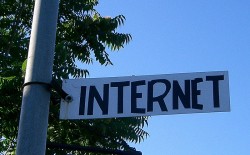Yes, you read the headline correctly. The Internet is about to run out of IP addresses. The Internet Assigned Numbers Authority has scheduled a press conference in Miami on Thursday to announce that they are distributing the last blocks of new Internet addresses. It is expected that all of those IP addresses will be fully distributed within 6 to 9 months and then there will be no more. The current IP address system, known as “IPv4”, can only support a little over 4 billion IP addresses and we have now almost reached that limit. The good news is that a replacement for the current system already exists, but the bad news is the the vast majority of Internet devices around the globe do not speak the “language” of the new system. This has the potential to create an Internet “headache” of mammoth proportions in the coming years.
Most of the time humanity will not start addressing a problem until it is staring us right in the face. Well, this problem has arrived. By making this announcement now, the Internet Assigned Numbers Authority (IANA) is hopefully giving us enough of a “kick in the pants” that the transition to the new system will not be a complete and total disaster.
Everyone knew that this day would eventually arrive, but the massive increase in the number of Internet devices over the past decade has caused it to arrive faster than most experts were anticipating.
The new system is known as “IPv6”, and it will have far more capacity than IPv4 has. As mentioned earlier, IPv4 cannot support much more than 4 billion IP addresses, but IPv6 can reportedly handle 340 trillion devices connected to the Internet at the same time.
Once all of the IPv4 addresses are gone, the only addresses that will be available will be IPv6 addresses.
So why doesn’t everyone just send out an “upgrade” or a “patch” for IPv6 right now and get it over with?
Well, unfortunately things are not quite that simple.
IPv4 and IPv6 are two different languages.
Let’s look at two examples. The following is an example of a hypothetical IP address under the current IPv4 system….
11.22.333.44
Under IPv6, IP addresses will look much different. The following is a hypothetical example of an IP address under the new system….
1111:db2:3f33::444:de5:6666:7e7
The big problem is that the vast majority of Internet equipment currently in use around the world has no way to process the new language.
As the new system is implemented, all kinds of compatibility problems could surface. A recent article posted on Salon explained it this way….
As Internet service providers run out of IPv4 addresses, they’ll have to give subscribers IPv6 addresses. The challenge lies in connecting them to websites that have only IPv4 addresses. In essence, IPv4 and IPv6 are different “languages.” Several “translation” technologies are available, but they haven’t been tested on a large scale.
But change has to come to the system. Once the IPv4 addresses run out we are going to be facing some huge problems.



Be the first to comment on "Uh Oh – The Internet Is About To Run Out Of IP Addresses!"